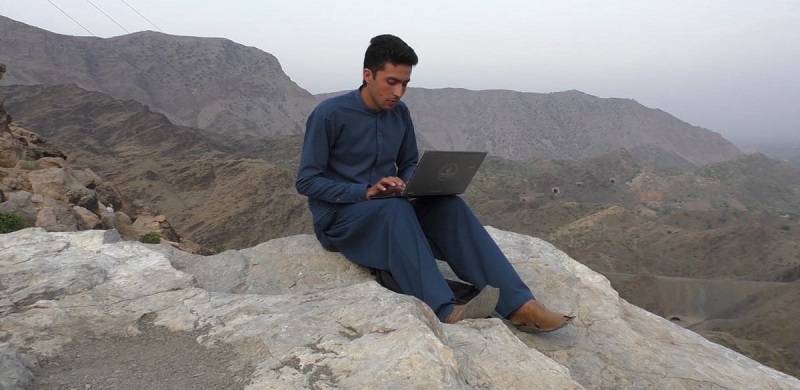
The digital divide is likely to be one of the major axes of inequality in this century. As more and more of politics, communication, education, commerce and entertainment move to cyberspace, access to the internet will become just as crucial as access to shelter, healthcare, etc.
In Pakistan, disparity in internet access immediately fits into the general contours of inequality. There is a very clear geography of internet access: with connectivity being somewhat better in major urban areas and next to non-existent in the more marginalized regions – further contributing to their “distance” from the Pakistani mainstream.
Around 35 percent of Pakistan's population has internet access. And to quote Federal Minister of Information Technology and Telecommunication Syed Aminul Haque, some 35 percent of Pakistan's territory is lacking in internet infrastructure.
As the COVID-19 pandemic makes it necessary to move large parts of the education sector online on an emergency basis, it has disproportionately affected students along class and ethnic lines. Students from marginalized regions who were earlier studying in major urban centres have been forced by the pandemic to move to their family homes, with their ability to access the internet accordingly hampered.
In parts of Balochistan, Khyber-Pakhtunkhwa (especially the former FATA) and Gilgit-Baltistan, connectivity is an absolute zero. Pakistani social media has seen many images of students in such regions sitting in all sorts of settings in a desperate attempt to catch signals: from rocky fields to hilltops. Rather than celebrating these images as a sign of the “resilience” of Pakistani populations – our standard response to people struggling for what should be their birthright – it is important to see them as disturbing symbols of deprivation.
Police repression aimed at protesting students in Balochistan has failed to silence the youth in educational institutions. And this is only understandable: this is a vital question of their future. Students in Gilgit-Baltistan have been using the hashtag #Internet4GilgitBaltistan in their quest for more accessibility. There have been demands for a semester break until issues of connectivity can be resolved.
Regardless of what solution is eventually found, the concerns being raised by these students are absolutely valid ones. To expect that students without reliable internet access attend classes online and somehow succeed in exams is callous to the point of cruelty.
In Pakistan, disparity in internet access immediately fits into the general contours of inequality. There is a very clear geography of internet access: with connectivity being somewhat better in major urban areas and next to non-existent in the more marginalized regions – further contributing to their “distance” from the Pakistani mainstream.
Around 35 percent of Pakistan's population has internet access. And to quote Federal Minister of Information Technology and Telecommunication Syed Aminul Haque, some 35 percent of Pakistan's territory is lacking in internet infrastructure.
As the COVID-19 pandemic makes it necessary to move large parts of the education sector online on an emergency basis, it has disproportionately affected students along class and ethnic lines. Students from marginalized regions who were earlier studying in major urban centres have been forced by the pandemic to move to their family homes, with their ability to access the internet accordingly hampered.
In parts of Balochistan, Khyber-Pakhtunkhwa (especially the former FATA) and Gilgit-Baltistan, connectivity is an absolute zero. Pakistani social media has seen many images of students in such regions sitting in all sorts of settings in a desperate attempt to catch signals: from rocky fields to hilltops. Rather than celebrating these images as a sign of the “resilience” of Pakistani populations – our standard response to people struggling for what should be their birthright – it is important to see them as disturbing symbols of deprivation.
Police repression aimed at protesting students in Balochistan has failed to silence the youth in educational institutions. And this is only understandable: this is a vital question of their future. Students in Gilgit-Baltistan have been using the hashtag #Internet4GilgitBaltistan in their quest for more accessibility. There have been demands for a semester break until issues of connectivity can be resolved.
Regardless of what solution is eventually found, the concerns being raised by these students are absolutely valid ones. To expect that students without reliable internet access attend classes online and somehow succeed in exams is callous to the point of cruelty.
